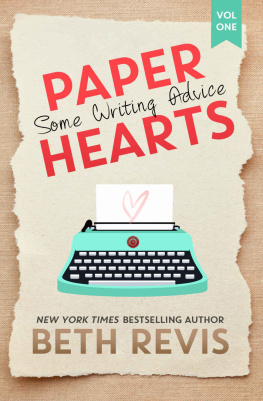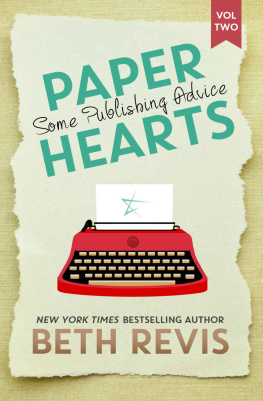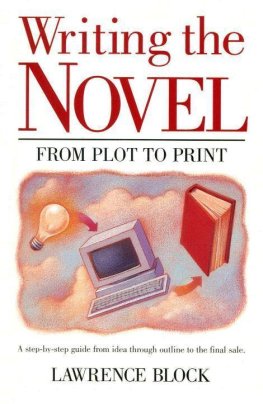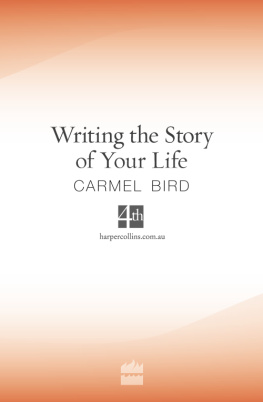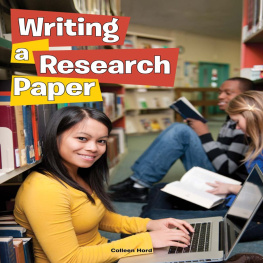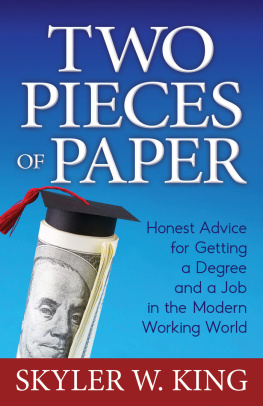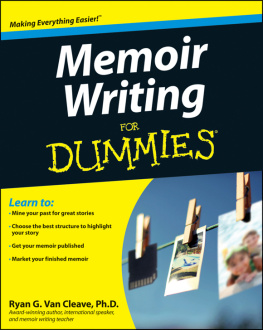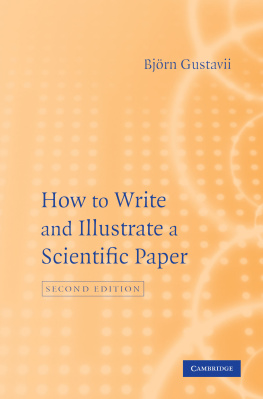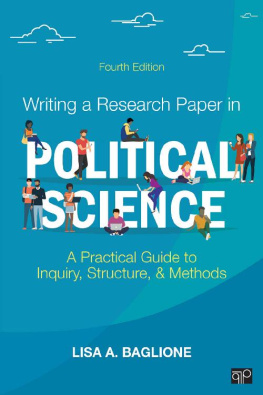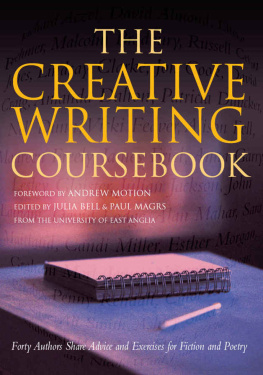Table of Contents
PAPER HEARTS Some Writing Advice BETH REVIS

Contents
PAPER HEARTS
Vol 1: SOME WRITING ADVICE
Copyright 2015 by Beth Revis
Cover design by Hafsah Faizal
www.bethrevis.com
www.iceydesigns.com
Publisher disclaimer: The material in this book is for informational purposes only. The author and publisher expressly disclaim responsibility for any negative effects that result from the use or application of the information contained in this book. Use discretion when making decisions regarding writing and publication of your work.
All rights reserved.
No part of this publication may be reproduced, stored in, or introduced into a retrieval system, or transmitted, in any form, or by any means electronic, mechanical, printing, recording, or otherwise, without the express written permission of the publisher prior to, except for the use of brief quotations in a book review. Electronic versions of the book are licensed for the individuals personal use only and may not be redistributed in any form without compensation and approval to and by the author. The scanning, uploading, and distribution of this book via the Internet or via any other means without the permission of the publisher is illegal and punishable by law.
Your support of the authors rights is appreciated.
First paperback edition: 2015
ISBN: 978-0-9906626-5-5 (print)
ISBN: 978-0-9906626-6-2 (ebook)

Created with Vellum
This book is dedicated to the writers
with stars in their eyes
and questions in their hearts.
Dei gratia.
A Note About Websites
THROUGHOUT THIS BOOK, the author occasionally refers to websites for further reading and resources. Please keep in mind that web content continually changes, and the author cannot control this.
For additional online resources, visit http://bethrevis.com/paperhearts
Introduction
The basics you need to know, the background I need to share, and the fundamental philosophies of this book.
ONE
Who I Am & What This Is
I USED TO BE A TEACHER.
When I say this, I do not mean that it was my job. I mean that it was a part of my identity. Of course, there were some bits of the job I didnt like (grading, politics, more grading), but the part I did liketeachingwas something that I loved so wholly that it became an ingrained part of who I was.
Or perhaps it was who I always was, and I just didnt know it.
Whenever there was a concept or theory or problem that I couldnt quite grasp, I taught myself by breaking it down into its elements and thinking of how I was learning, not just what I was learning. My notes when I was a student were always a mess of charts and arrows and connections between ideas (and short stories and poems scribbled in the margins).
Everyone has a different way of thinking, and my way of thinking tends to be an analysis of how an idea develops. I do not at all believe in muses, although I do believe in inspiration. I dont get writers blockI discover bad story structure. Stories themselves are layersnot just in history and symbolism, but also in structure and plot and character development. Just like when I was a teacher and would find lesson plans in the oddest places, now I read stories and tend to see beyond the words, Matrix -like, into the scaffolding.
I say this now so that you understand any advice I give is merely what has worked for me, and this all comes from my own self analysis. I am not at all an expert, and you should never entirely trust anyone that tells you how to write. Write the way you writeif it gets words down on paper, its more than good enough. But this book is the sort of thing that would have helped me when I was starting out, so I thought Id share it with you.
TWO
A Short Bio of My Writing Life
I FEEL a little bit like a tool writing about myself, but I also do not presume that people know who I am, so it feels a bit in order that I explain.
Who I am now: A NY Times and IndieBound bestselling author whose works are published in more than twenty languages. I have a completed YA science fiction trilogy published with Penguin/Razorbill (starting with Across the Uni-verse ), a companion novel I published on my own, a contract for more books to be published, and some more with my agent for submission.
And yet...
Who I am now: Someone who is still seeking validation and constantly worries her writing isnt good enough.
Perhaps that is because of who I was before.
I wrote my first novel when I was eighteen years old and a sophomore in college. I was trying to write a short story, but I couldnt figure out how to end it, so I kept going and going and going and wound up with a book. I wrote a sequel to it. I realized that I had a trilogy on my hands, and for the first time, thought of publishing.
One of the first things I did was analyze what I wanted out of my writing. I wasnt happy just writingI wanted to share my stories with the world. But I also didnt want to self publish yet. This is a perfectly viable option for people, but for my first forays into fiction, I had dreams of a big New York publisher.
I think that moment, where I decided what, exactly, I wanted, was one of the most important things I did for my career as a writer. You should know that when it comes to how you publish (as much as how you write), there is no right answer for everyonebut there very well may be a right answer for you. Think about what you want, and what youre willing to do for it. For me, I wanted a publishing deal from a major publisher. This meant that self publishing and small presses were not an option for me, but that also meant that when my books didnt sell to a major publisher, I would have to move on to another book. I limited my choices and therefore limited my chancesbut ultimately, I believe I made the right decision for me, and Im extraordinarily happy with the way things turned out.
That said, the road to get here sucked.
After writing two novels in my undergrad years, I started seeking publication. I knew very little about the process, but ultimately, the formula is simple. For traditional publication with a major house, you need an agent. To get an agent, you have to have: a perfectly written book with sales potential, a banging query letter that will get the agents attention, and professional presentation of both those things. It really is as simpleand difficultas that.
So I started querying.
The first novel was soundly rejected, and it became very clear to me early on why.
It wasnt good enough.
At its heart, that first novel was an extended fan fiction of my favorite story, heavily influenced by books and movies, with a loose plot that didnt really make much sense. It was rather easy to let that one (and the sequel Id already written) go.
Still in college, I wrote another book. (Can you tell that I found many classes boring in college? I wrote stories instead of taking notes.)
I cannot express to you how much I loved this novel. And still do, honestly. It was the book of my heart. I almost didnt have to think about the writing; Id sit at the keyboard and type until my fingers ached. Every novel Ive written since that one has been my attempt at recreating that magic.
When I finished it, I knew I had something special.
I started querying. I could tell this was different from before. Agents were interested. They were still rejecting me, but they were hand writing notes along the lines of, I love this but cant take it! or The writings really strong, but this just isnt for me! I went to conferences. I joined the Society for Childrens Book Writers and Illustrators (SCBWI). I networked. I joined social media and started following agents. I read books on how to get published. I got beta readers and critique partners and joined writing groups both online and in person. I wrote not just one, but five sequels for this novel. I knew I knew it was amazing and one of the best things I ever did or would ever create.
Next page
